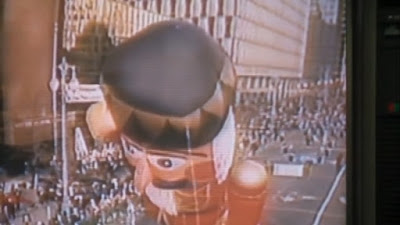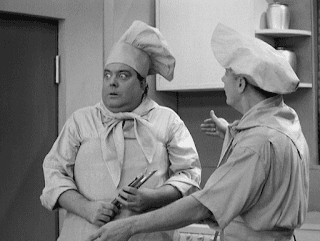During my first winter break from college, I was back home, and for the first time ever, I had a television in my bedroom. I may have mentioned it before, but during that first semester away at school, I did not have a roommate. Living alone and on the other side of campus from my friends, I spent the bulk of my savings to buy a PlayStation 2 used off eBay. When it arrived, I attached it to my little 12" television (the kind with the VCR combo) right there on my desk, so I could play while I "studied."
I spent a lot of the semester playing Grand Theft Auto: Vice City, and when I returned home in mid-December for the month and a half before school started up again, I brought it home with me. I left much of my stuff there for when break was over, but my TV and PlayStation came home. So, at home, I spent a lot of free time and late nights playing GTA: Vice City.
After a week or so of playing Vice City up in my old bedroom until my eyes were red, I realized that a lot of my friends from high school weren't around. They were busy with family vacations, part-time jobs, and other commitments, so I was on my own.
After moping a bit and evading the cops on Vice City some more, I got the idea that this would be a great time to see a bunch of the movies I had always wanted to see.
I downloaded a list called "100 Movies You Should See Before You Die" or something like that, and went through it top to bottom. I crossed off any horror film, since I'm not a fan of the genre, and any foreign non-English film. Some of the movies I had already seen.
I came up with about 40 movies (give or take) that I wanted to see.
I took several trips to One Dollar Video and managed to get in as many as I could. I saw things from all-time classics to silly romps. From the Godfather trilogy to Space Balls, from Gone with the Wind to Lost in Translation. Stuff on my list got scratched off one by one, but I didn't get to everything before going back to school toward the end of January.
I wish I had kept the list, just to see what I had left.
One of the movies, along with a handful of other '80s classics, was Summer Rental.
I've always loved John Candy. As a youngster, I enjoyed his work in Home Alone, The Great Outdoors, and Camp Candy, so I was eager to check out one of his earliest films when Summer Rental made my list.
I loved it, and it's since found its way into my rotation of frequently watched movies.
Released on August 9, 1985, 40 years ago last week (as I write this in 2025), Summer Rental hits this milestone anniversary, causing me to reflect on its place in the pantheon of 1980s comedies and the legendary career of John Candy.
Directed by the legendary Carl Reiner and starring a very young John Candy in his first leading role, this Paramount Pictures film follows an overworked air traffic controller who drags his reluctant family to a Florida beach town, only to encounter a series of escalating disasters. From mistaken house rentals to sailing mishaps and clashes with pompous locals, the movie perfectly depicts the chaotic joy of summer vacations.
Summer Rental arrived during a golden era of comedy films, sandwiched between hits like National Lampoon's Vacation (1983) and The Great Outdoors (1988), both of which featured Candy. Yet, Summer Rental stands out for its heartfelt portrayal of family bonds and absurd situations. The movie has quite a bit of emotional depth, despite its comedic overtones.
Over the decades, Summer Rental has cultivated a very loyal fanbase who cherish the memorable characters, its quotability, and the nostalgic depiction of 1980s middle-class America and Florida beach culture.
In an age where streaming resurrects forgotten films, Summer Rental continues to resonate with new viewers because it reminds us all of simpler times when a family road trip led to hilarity. Whether you're a longtime fan of the movie like me, or discovering it for the first time, four decades later, the film remains a perfect "rental" for any summer evening. Ha!
At its core, Summer Rental is a fish-out-of-water type comedy that follows John Candy as Jack Chester, the stressed-out Atlanta air traffic controller whose job-induced meltdown earns him a mandatory five-week vacation. Reluctant to unwind, Jack packs up his wife Sandy (Karen Austin) and their three kids, teen daughter Jennifer (Kerri Green), mischievous son Bobby (Joey Lawrence), and quirky youngest Laurie (Aubrey Jene). They head for a summer-long vacation in the fictional Citrus Cove, Florida, and what starts as a promising getaway quickly spirals into chaos.
Upon arrival, the Chester family is ousted from a fancy restaurant by the rich and arrogant local sailing champion Al Pellet (the great Richard Crenna), setting the tone for their misfortunes. Later that night, they discover they had accidentally moved into the wrong house (thinking 415 Beach LANE was 415 Beach ROAD) and were promptly kicked out by the bewildered residents. They settle into their actual rental home, a rundown beach shack on the heavily trafficked path to the public beach.
Jack's relaxation is thwarted by everything from vicious sunburns to jellyfish stings and a packed public beach with no room to stretch out. A turning point in the film comes when Jack injures his leg in a boating collision with Al and befriends Scully (Rip Torn), the eccentric owner of a pirate-themed restaurant called The Barnacle.
When the landlord for the Chesters' rental shack dies mid-summer, Al Pellet inherits the property and demands, strictly out of spite, that the Chester family vacate the property unless Jack pays over $1,000 in back rent. According to the inflation calculator, that would be like asking someone for $3,570.00 in today's money.
Out of desperation, Jack challenges Pellet to a race in the annual Citrus Cove Regatta in exchange for spending the rest of the summer in the house. With Scully's help, Jack transforms The Barnacle Restaurant into a makeshift sailboat, recruiting a ragtag crew and his own family. In the nail-biting finale, Jack's team wins by tossing excess weight (the restaurant's cooking equipment and frozen foods) overboard. His victory secured the house for the remainder of the summer.
The humor in the film stems from the relatable portrayal of vacation pitfalls, mainly through John Candy's physical comedy. Subplots add several layers, too, like Jennifer's budding romance with the buff lifeguard, Gregg (Tom Blackwell), and Sandy's quiet frustrations with her husband's moodiness and the poor accommodations. There was also a romantic entanglement for Sandy with John Larroquette's character Don, but after poor audience testing, the romance angle was cut in favor of just being a kind friend.
Summer Rental, as a story, can be traced to producer Bernie Brillstein's own disastrous beach vacation in Southern California, where neighborly squabbles and rental house woes inspired the entire script. Mark Reisman and Jeremy Stevens, later known for their work writing for TV comedies like Wings, crafted a screenplay that echoed Brillstein's anecdotes, placing real-life frustrations amidst exaggerated humor.
Development began at Paramount under executives Barry Diller, Michael Eisner, and Jeffrey Katzenberg, but Eisner and Katzenberg departed for Disney before production ramped up. New studio head Ned Tanen approved the film to fill a gap in the summer release slate, budgeting it at around $10-15 million, a modest cost for the era.
Filming kicked off on March 18, 1985, and lasted nine weeks. The bulk of principal photography occurred in St. Petersburg and St. Pete Beach, Florida, capturing authentic coastal scenery. Iconic locations like the St. Petersburg Pier are featured prominently, adding a layer of realism to the fictional Citrus Cove.
After seven weeks in Florida, the crew relocated to Atlanta for interior scenes, including the air traffic control sequences shot at the FAA Atlanta Air Route Traffic Control Center in Hampton, Georgia.
Reiner collaborated closely with Candy on improvisations that added Candy's signature warmth to Jack's character. Reiner also emphasized practical effects for the boating mishaps, using real sailboats rather than stock footage and movie magic, to heighten the comedy's authenticity. Composer Alan Silvestri provided the score, highlighted by Jimmy Buffett's original song "Turning Around," which plays over the credits and boat repair scenes. The soundtrack, released on limited-edition CD in 2014 and vinyl in 2023, has become a bit of a collector's item.
Post-production was hurried to meet the August release. Plans for a follow-up film with Candy and Reiner, titled The Last Holiday, fell through, but Summer Rental solidified their creative bond. Overall, the production was a testament to efficient 1980s filmmaking, prioritizing ensemble chemistry over big-budget spectacles.
The ensemble cast brought the quirky world of Citrus Cove, Florida, to life.
Candy's Jack Chester was the harried everyman with good intentions. Crenna excelled as the smug yachtsman whose comeuppance is immensely satisfying to viewers. Rip Torn shined as Scully, the one-eyed pirate with a heart of gold. Karen Austin's portrayal of Sandy Chester grounds the family unit and shines as the supportive but exhausted wife.
Kerri Green was fresh from The Goonies, and plays Jennifer, the flirtatious teenage daughter that adds another layer of stress to Jack's life. John Larroquette's Don Moore adds flirtatious tension, but the real romance angle with Sandy, cut for audience taste, leaves him just as an odd, overly-friendly member of the community.
Also, I must not forget to mention Lois Hamilton as the flirty (and self-exposing) neighbor Vickie Sanders and Carmine Caridi as her husband Ed.
John Candy was the first cast member attached to the film, his rising star from Splash (1984) making him ideal for the lead. Reiner praised Candy's "handsome guy in a larger frame" physique (significantly smaller than he'd be in future roles), perfect for physical gags like the sunburn scene.
Candy earned $800,000, a hefty payday for the time, reflecting his growing clout.
Richard Crenna was cast as Al, bringing unexpected menace to the comedy. Rip Torn's role as Scully was tailored to his eccentric persona and he was allowed to improvise pirate lingo, enhancing the character. Karen Austin, only 28 when filming the movie, was chosen to be Candy's wife (who himself was only 35) despite being only 12 years older than her on-screen daughter Kerri Green. Makeup and wardrobe helped sell the motherly role.
.
No article about Summer Rental would be complete without spotlighting John Candy, whose portrayal of Jack Chester anchors the movie's emotional core. Born on Halloween day, 1950, Candy was 34 years old during filming, and turned 35 shortly before its theatrical release. At this point in his career, he was already becoming a known name in comedy, thanks to breakout work on Canadian sketch show SCTV, where he honed his timing alongside comedic legends Catherine O'Hara and Eugene Levy.
By 1985, Candy had transitioned to Hollywood stardom with supporting roles in hits like Stripes (1981), where he played the lovable recruit Ox, and Splash (1984), as Tom Hanks' boisterous brother Freddie. These performances showcased his ability to blend physical comedy with genuine warmth, making him a go-to for directors seeking the relatable, and often downtrodden, everyman. Summer Rental marked his first starring role, a milestone that proved his leading-man potential despite industry biases against his size.
Immediately before Summer Rental, Candy appeared in Brewster's Millions (1985), playing Spike Nolan opposite Richard Pryor.
These other roles kept him busy, but Summer Rental allowed him to carry a film, drawing on personal experiences as a family man (he had two children with his wife Rosemary).
After Summer Rental, he starred in Volunteers (1985), again with Tom Hanks, before hits like Planes, Trains and Automobiles (1987), The Great Outdoors (1988), and Uncle Buck (1989).
Upon release, Summer Rental opened to a solid $5.75 million weekend, ranking second behind a little movie you may have heard of, called Back to the Future. It grossed $24.7 million domestically, a respectable haul for a mid-tier comedy in the 80s. Worldwide figures matched the U.S., totaling around $25 million, placing it 22nd in the 1985 summer box office, far behind blockbusters like Rambo: First Blood Part II ($150 million) but ahead of many others.
Critically, the reception was mixed but positive. Janet Maslin of The New York Times called it a "wan but good-natured hot-weather comedy." She said it was too indebted to National Lampoon's Vacation but with "nicer touches." Variety praised it as a "collection of bits" that captured summertime fun. Some critics found it formulaic, but audiences mostly embraced its lightheartedness.
Over time, home video boosted its popularity, turning it into a cable staple.
Forty years later, Summer Rental still stands as an icon of the 1980s golden age of comedy, its stellar cast, and Candy's iconic performance having cemented its legacy. While box office numbers were solid rather than overly spectacular, fan devotion (evident with the 2025 social media buzz over its anniversary) proves its cultural staying power.
Summer Rental is a reminder that even the worst vacations can yield the best memories.












.png)




Comments
Weird. I’ve honestly never heard of this one. I am a John Candy fan, so I would’ve thought I would at least know about it a little even if I had never actually seen it.
ReplyDeleteWell, one more thing I have to look for now.
Btw, I STILL have not found EuroTrip despite activity looking for it every chance I’ve had - including painstakingly combing one-by-one through over a thousand used dvd’s at a Friends of the Library sale the other month…
Well, if you give up and want me to send you a copy of Eurotrip, let me know! Of course, the hunt is always the fun of it!
ReplyDeleteThank you for the generous offer, but I will never give up. I am THAT stubborn.
DeleteAnd yes, it’s all about “the hunt” - I know I could also just buy it online, but that would defeat the purpose. Someday I will find it… or I’ll be cursing you out on my deathbed for making me waste years of my life searching for these dvd’s.